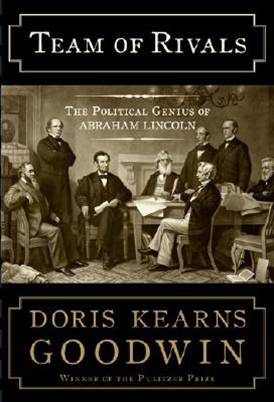 |
| Team of Rivals: The Political Genius of Abraham Lincoln (Photo credit: Wikipedia) |
The more I study American history, the more I realize how
little I really know. I just completed Doris Kearns Goodwin’s Team of Rivals
in which she explores the inter-workings, personalities and politics of the
Lincoln administration. Every American
schoolboy or schoolgirl knows that Lincoln presided over the most difficult
period in American history save the George Washington era. Most know that he struggled with a series of
second rate generals until Grant emerged. And that he was tragically assassinated
just as the War Between the States ended.
But how many of us know that many of the cabinet members
opposed Lincoln in the primary? That
many of those thought he was unqualified for the office? That one of them – Salmon Chase – actually
tried to build support to oppose Lincoln in the 1864 election? Or that Lincoln’s opponent in 1864 was former
General McClelland, who so famously failed to take advantage of his superior
numbers early in the war. Or that the
Democratic Party had a substantial “peace wing” that was prepared to negotiate
an end to the war in 1864 that would not have required the freeing of slaves? Or that his first love was one Ann Rutledge,
who he undoubtedly would have asked to marry, however, she died very young,
sending young Lincoln into a deep lasting depression. He was in such despair that friends feared
for his life.The book summarizes his early life, but really begins with Lincoln as a young lawyer in Illinois, and tracks his career, which had numerous, severe setbacks, through his very clever strategy to win the 1860 nomination, up to his assassination. My admiration at Lincoln’s talents only grew as I read this work. I had no understanding of his deep political skills but Goodwin brings out his knowledge of human nature, ability to connect to people, and his careful analysis of the landscape that let him out-maneuver rivals. The book is appropriately subtitled The Political Genius of Abraham Lincoln.
Lincoln, with his plain appearance, lack of a formal
education (he was almost entirely self-taught, quite literally reading with
candlelight after long hard days of farm labor), from the humblest of
situations, was consistently underestimated by the press, rivals and even
foreign governments. To a certain extent
he probably used that to his advantage.
Widely disparaged in the press and by political opponents as “that rail
splitter from Illinois” as the Presidential election unfolded, and even more in
the early days of his administration, by the end of the war, “rail splitter”
was a term of admiration and endearment.
Of course, as the title suggests, he was also able to
overlook, not just slights, but harsh, demeaning rhetoric from rivals to
recruit the best possible Cabinet ministers.
(As an aside, one forgets how the Cabinet has exploded in membership –
his consisted only of a handful, including War, Interior, Treasury, Attorney
General, State and Postmaster General.
It is probably time to downsize our current Cabinet). Many were reluctant recruits, believing that
they were far more qualified to be President than Lincoln. Over the next five years however, he earned
their respect, trust, and confidence and to a man they came to the realization
that he was one of the greatest Presidents.
One of the interesting facets of Abraham Lincoln was his
spirituality. He was clearly a Bible
scholar. His mother provided most of his
early education, in part by reading scripture.
He was seen on numerous occasions, including during his Presidency,
studying his Bible, and could quote scripture – including some fairly obscure
passages, at will. We can assume that he
believed in God, however, it isn’t nearly so clear that he believed in an
afterlife.
To her credit, Ms. Goodwin does not speculate on what would
have happened in a Lincoln second term.
He made it crystal clear that he was completely opposed to a vindictive
approach to the conquered South. His death put (only barely qualified) Andrew
Johnson into the office. One can
question whether there was anyone who could have stepped in to follow the
brilliant and immensely capable Lincoln and succeeded, but it certainly was not
Johnson. Lincoln’s death was a tragedy
for the country, quite possibly for two generations, as the incredibly corrupt
Reconstruction, rise of segregation and the Ku Klux Klan ensued.
When I read this kind of wide-ranging history, with
references to hundreds of diary entries, letters, speeches, etc. I marvel at
the time it must take to write such a work.
Ms. Goodwin, in her notes, mentions 10 years of research. But she is not just a great researcher, she
is a great story teller. This could have
been dry and dull but it is the opposite – great history and a great read.
Highly recommended.

Comments